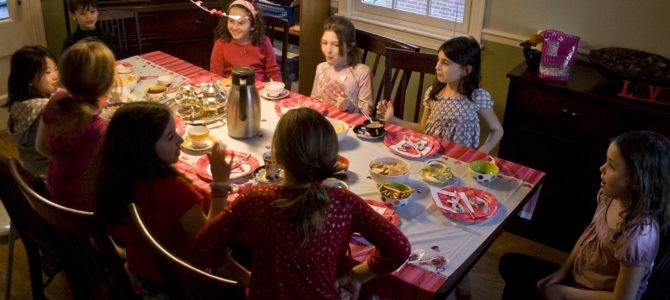
Valentine’s Day is coming up. I’ve been pondering a memory that has nothing to do with roses or chocolate, but is deeply connected to the reasons behind our celebration of February 14.
I once walked into a church bathroom and saw a preteen girl jumping up to hang by her hands from one of the timeworn wooden partitions separating the stalls. She grinned. We both knew her misuse of someone else’s property was hardly ideal behavior.
“Be careful,” I said feebly. She let go and walked out.
Afterwards, I thought about my wording. Citing her physical safety was the “safe” thing to do — it’s the easy way, in modern society, to reprove people. Yet her impulsive acrobatics were far more likely to damage the elderly stalls than herself. Besides, the real reason I felt the urge to say something was that I felt her actions weren’t respectful.
I’m sure my own children will be guilty of equivalent lapses many times over the years. However, the incident lingers in my memory because it prompted me to think about the way we talk to our kids and the way I want other adults to speak to my children when they see them doing things they shouldn’t.
It’s funny how even in Christian circles, we often end up behaving as if physical harm is a bigger evil than moral or spiritual harm. When we see a rebellious three-year-old running away from his frazzled mother in a parking lot, do we tell him it’s wrong to disobey his mother, or that parking lots aren’t safe places to run?
Obviously, the Ten Commandments aren’t a club for us to wield to modify young people’s behavior. However, the way we prioritize personal safety and personal comfort feeds into the larger cultural message about how humans ought to live.
Our kids receive a constant stream of messages that they can be anything they want to, that they should follow their dreams, that they are awesome; and that the one big moral restriction on their actions is the need to “stay safe.” This all sounds generous and empowering. However, do our kids know that being successful and safe is not actually a moral duty?
If they find themselves in a situation where they must choose between staying safe and, say, denying their Lord, will they know that martyrdom is not a sin? That it is not failure? That it will not disappoint the Christian adults who care about them? I hope so.
On St. Valentine’s Day, we remember a Christian martyr. Much of his life is lost to obscurity. It is said that on the day of his death, he wrote a note of encouragement to the daughter of his jailor, thus inspiring the tradition of exchanging notes on his saint’s day. Then he was executed.
The Christian church has a long history of remembering the lives of people who failed to stay safe and successful. It’s funny how awkward modern Christians tend to feel about this. Our kids probably all know about Daniel in the lion’s den, but do they know about the stoning of Stephen? How many of us tell our kids about St. Valentine and his death?
How many of us hold up St. Lucia as a good example to our children? She gave away all her money to the poor, thus sacrificing her chance at marriage—i.e., a “normal” life—and her eyes were gouged out before she was slain.
As a mother, I want to keep my children safe. I want them to experience long, useful, joyful lives. Yet as Valentine’s Day approaches, I am reminded that my job isn’t just to give them chocolates and tell them I love them. It is also my job to point them toward a Christian understanding of suffering.
We don’t embrace stories of martyrdom because we are gloomy or masochistic. We remember the martyrs because we share with them the glorious hope of the Resurrection. We rejoice in the knowledge that we don’t have to keep ourselves safe, as our Lord has already died for us. He grants us salvation and brings us into the eternal joy we could never win for ourselves.
This Valentine’s Day, I’ll make some cards for my kids. I’ll also tell them about St. Valentine.









